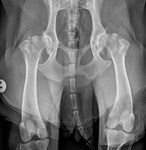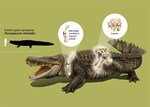Search - Research
131 - 140 of 433 results
-
New Pet Plan Charitable Trust award
Dr Rebecca Geddes has been awarded a Pet Plan Charitable Trust Pump Priming Grant to research “Is upper urinary tract stone formation in cats caused by disrupted calcium-phosphate metabolism?” Kidney stones are a common problem in many species, …Dr Rebecca Geddes has been awarded a Pet Plan Charitable Trust Pump Priming Grant to research “Is …
-
Feline Hypertrophic Cardiomyopathy study
Hypertrophic cardiomyopathy (HCM) is the most common heritable cardiac disease in humans and cats with a prevalence of 1/500 and 1/7 respectively. HCM occurs spontaneously in cats and can cause heart failure, cardioembolic complications or sudden …Hypertrophic cardiomyopathy (HCM) is the most common heritable cardiac disease in humans and cats …
-
New more accurate technique discovered for understanding joint behaviour in world’s most common musculoskeletal condition
A new technique that can determine joint behaviour in health and in conditions such as osteoarthritis with more accuracy than ever before has been created by researchers. A broad coalition of life and physical scientists from the Royal Veterinary …A new technique that can determine joint behaviour in health and in conditions such as …
-
Angela Holder (early career researcher) awarded a grant to host a LIDO REP summer student
Dr Angela Holder was awarded a grant to host a LIDO REP summer student over summer 2019. This was for an 8 week placement that was aimed at undergraduate students from universities where the numbers of students that go on to do PhDs is low. The …Dr Angela Holder was awarded a grant to host a LIDO REP summer student over summer 2019. This was …
-
RVC joins prestigious network to preserve the UK’s reputation for world-leading research
The Royal Veterinary College (RVC) has today announced it has joined the UK Reproducibility Network (UKRN), in collaboration with nine other leading UK universitiesThe Royal Veterinary College (RVC) has today announced it has joined the UK Reproducibility Network …
-
RVC Professor Awarded for Outstanding Contribution to Animal Research
Professor Dominic Wells of the Royal Veterinary College was presented with a prestigious award at the annual Openness AwardsProfessor Dominic Wells of the Royal Veterinary College was presented with a prestigious award at …
-
Ancient bus-sized crocodile had extra vertebra to assist movement, new study shows
An ancient caiman that weighed as much as an Asian elephant (3 tonnes) and almost was as long as a bus (8 metres) had unique specialisations to help it move, a new study shows. The Royal Veterinary College’s (RVC) Professor John Hutchinson joined … -
Coming along in leaps and bounds – crocodiles can gallop but alligators can’t, new study finds
It’s a motion more closely associated with horses, but researchers have found that more species of crocodiles can gallop than previously thought. The study, which was led by the Royal Veterinary College (RVC), also discovered that by contrast … -
Initiatives to control and eliminate parasitic disease are reaching targets earlier than projected
Data, analysed by researchers, from nine national schistosomiasis control programmes, identified that the majority of initiatives acrosssub-Saharan Africa and Yemen have reached the disease-control target by two treatment rounds or lessNew data, analysed by a group of leading researchers, from nine national schistosomiasis control …
-
While demand for brachycephalic dogs remains high, understanding whether the body shape of brachycephalic breeds can be refined to reduce the risk of conformation-related disease is of priority. RVC research in this area worked to identify conformational risk factors for common disorders, and define ‘healthy conformational limits’, thresholds beyond which the risk of disease becomes unacceptably high.
Investigating healthy conformational limits
While demand for brachycephalic dogs remains high, understanding whether the body shape of brachycephalic breeds can be refined to reduce the risk of conformation-related disease is of priority. RVC research in this area worked to identify conformational risk factors for common disorders, and define ‘healthy conformational limits’, thresholds beyond which the risk of disease becomes unacceptably high.









